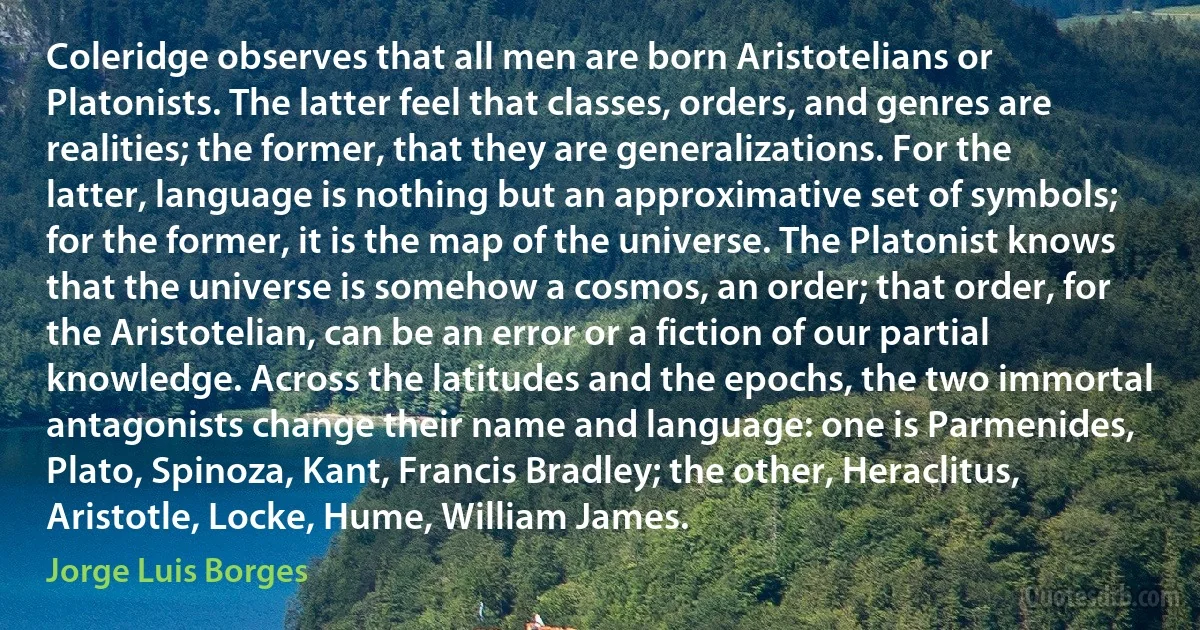
Coleridge observes that all men are born Aristotelians or Platonists. The latter feel that classes, orders, and genres are realities; the former, that they are generalizations. For the latter, language is nothing but an approximative set of symbols; for the former, it is the map of the universe. The Platonist knows that the universe is somehow a cosmos, an order; that order, for the Aristotelian, can be an error or a fiction of our partial knowledge. Across the latitudes and the epochs, the two immortal antagonists change their name and language: one is Parmenides, Plato, Spinoza, Kant, Francis Bradley; the other, Heraclitus, Aristotle, Locke, Hume, William James.
Jorge Luis BorgesRelated topics
across aristotelian born change error men knowledge language name nothing order partial set aristotle locke Kant Bradley Coleridge Heraclitus Hume Parmenides WilliamRelated quotes
Men fall, roughly speaking, into two flocks: Those whose intelligence is uninquiring in the face of Art, and does not demand to be appeased before their emotions can be stirred; and those who, having a speculative bent of mind, must first be satisfied by an enlightening quality in a work of Art, before that work of Art can awaken in them feeling. The audience of the realist is drawn from this latter type of man; the much larger audience of the romantic artist from the former; together with, in both cases, those fastidious few for whom all Art is style and only style, and who welcome either kind, so long as it is good enough.

John Galsworthy
My hope is that Casino Royale has not only re-invented James Bond, but made him relevant for the 21st century. The target audience has shifted. Although there's nothing in Casino Royale that will exclude teenagers, this 007 is aimed squarely at adults. The November release date is also perfect - the film is almost too dark and serious for the kind of lighthearted, mindless fun we associate with summer blockbusters. In recent years, I have come to each new James Bond movie with a series of ingrained expectations. For the most part, the Brosnan films met them across the board. Casino Royale defies many of them, and I couldn't be happier.

James Berardinelli
And you, amiable debauchees, you who since youth have known no limits but those of your desires and who have been governed by your caprices alone, study the cynical Dolmancé, proceed like him and go as far as he if you too would travel the length of those flowered ways your lechery prepares for you; in Dolmancé's academy be at last convinced it is only by exploring and enlarging the sphere of his tastes and whims, it is only by sacrificing everything to the senses' pleasure that this individual, who never asked to be cast into this universe of woe, that this poor creature who goes under the name of Man, may be able to sow a smattering of roses atop the thorny path of life.

Marquis de Sade
The purpose of the State is, as we have already shown in our last lecture, no other than that of the Human Race itself:-to order all its relations according to the Laws of Reason. It is only after the Age of Reason as Science shall have been traversed, and we shall have arrived at the Age of Reason as Art, that the State can reflect upon this purpose with clear consciousness. Till then it constantly promotes this purpose, but without its own knowledge, or free pre meditated design; prompted thereto by the natural law of the development of our Race, even while it has a totally different purpose in view;-with which purpose of its own, Nature has indissolubly bound up the purpose of the whole Race.

Johann Gottlieb Fichte
Do everything simply and meekly. Do nothing with an ulterior motive. Don't say, I'll do this in order to have that result, but do it naturally, without taking cognizance of it. That is, pray simply and don't think about what God will bestow on your soul. Don't make any calculations. You know, of course, what God bestows when you enter into communion with Him, but it is as if you don't know. Don't discuss the matter even with yourself. So when you repeat the prayer, "Lord Jesus Christ, have mercy on me”, say it simply and ingenuously and think of nothing other than the prayer. These are very delicate matters and the intervention of the grace of God is required.

Porphyrios of Kafsokalyvia
